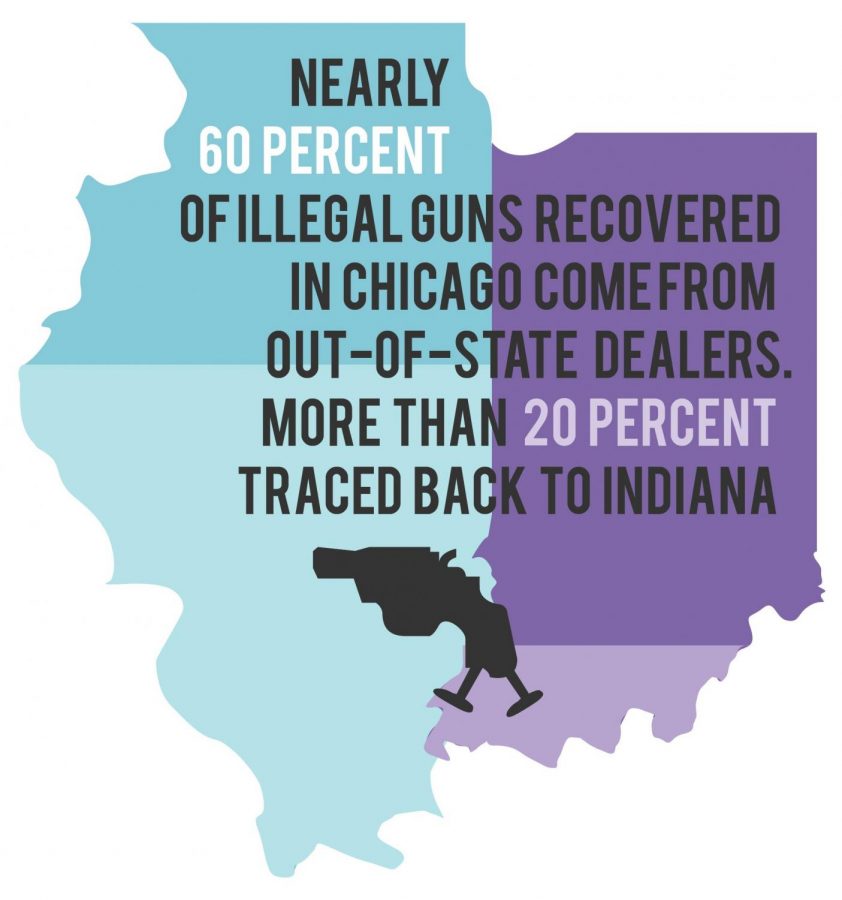Study: Majority of Chicago guns trafficked from out of state
Study: Majority of Chicago guns trafficked from out of state
November 6, 2017
With Chicago struggling to solve its gun violence problem, a recent report shows the majority of guns used in crimes have been illegally trafficked from outside city limits.
Released Oct. 29, the 2017 Gun Trace Report—a collaboration among the city, Chicago Police Department and the University of Chicago Crime Lab—analyzed firearm trace data in the city from the past four years. The report shows CPD has confiscated nearly 7,000 crime guns—illegally possessed firearms used or suspected to have been used in a crime—since 2013.
Although 40 percent of the guns were traced back to suburban Illinois shops, 60 percent came from surrounding states with looser gun regulations.
“We have data showing [Chicago] this, showing we have a problem, what we should do as a state [and] what we can do [to] address that problem,” said Colleen Daley, executive director of the Illinois Council Against Handgun Violence.
Indiana is the primary out-of-state source for Chicago guns, with 21 percent of crime guns imported from there, according to the report.
Indiana requires no background check for purchasing a firearm from a private seller, a gun show or on the internet, and the number of guns that can be bought at any one time is not restricted.
“I can drive to Indiana and load up a duffel bag full of guns, where there was never a background check,” Daley said. “They don’t care who I am or what I’m doing; they’re just trying to sell a product, and I’m buying it.”
To address illegal gun trafficking in Chicago, Daley’s group is promoting Illinois Senate Bill 1657, which would create the Gun Dealer Licensing Act—making it unlawful for someone to sell, lease or transfer firearms without a license from the Department of Financial and Professional Regulation. The bill passed in the Senate in April and might be called for a House vote the week of Nov. 6, according to Illinois legislative records.
This would license Illinois gun stores and would hold the “bad apple” gun dealers accountable, Daley said.
“What we want [is] to make sure they have basic security measures in place [and] they’re keeping accurate records,” Daley said. “If we cut off the 40 percent of the supply, we’re going to see a reduction in gun violence.”
The report noted that the passage of the Gun Dealer Licensing Act would also provide a critical tool to deter straw purchasing—a person buying a gun for another person—as well as implementing anti-theft measures and aiding local law enforcement in trafficking investigations.
The out-of-state gun influx is an important contributor to the illegal gun market, and in order to interrupt it, there needs to be an understanding about where guns are coming from, said Jessyca Dudley, program officer for The Joyce Foundation’s gun violence prevention program.
Law enforcement, the city and the state should work to trace the gun back to the original purchaser and see where it went wrong, she added.
“Many of the guns that were covered in crime were not owned by the people who were legally able to own guns,” Dudley said. “We need to understand how people are getting those guns, the sources of where those guns come from and how we can disrupt that flow of guns.”
Policy should focus on preventing guns from getting into the hands of people with a tendency for violence, according to the report.
Another method to combat gun violence is to address it as a health issue, said Charlie Ransford, senior director of Science and Policy for Cure Violence in Chicago.
The best approach the city can take to lower gun violence is to invest in a health-based approach that treats violence as an epidemic, stopping it before it happens. It is about interrupting events and having respected community members detect and intervene on conflicts before they turn into a shooting and provide an alternative to violence, he added.
“If the city wants to get serious about reducing violence, they’d invest in these programs that have the scientific basis and have scientifically been proven to reduce violence,” Ransford said.








